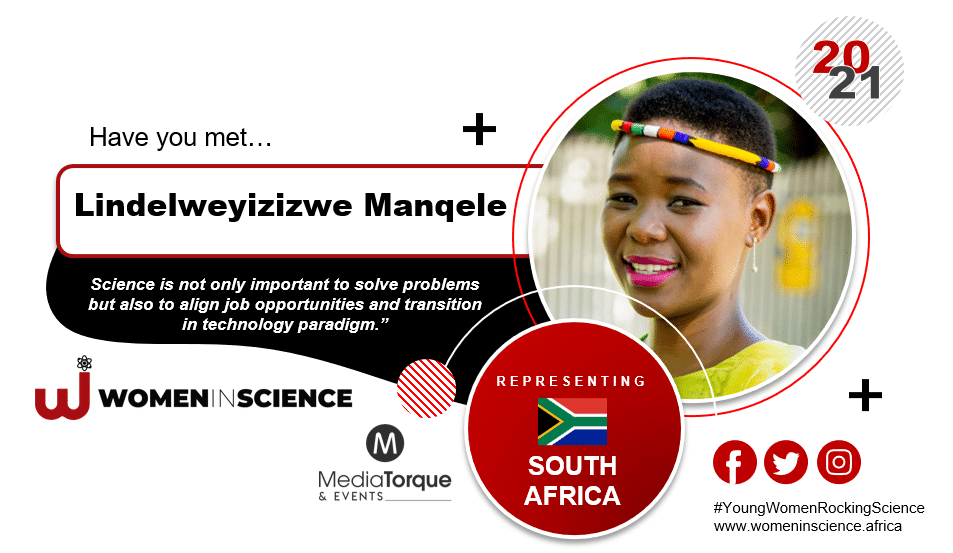Thabo Mohlala
Lindelweyizizwe Manqele belongs to a rare breed of mathematics whiz kids in a country where most learners consider mathematics a ‘difficult’ subject. In fact, various surveys and studies consistently revealed that South African learners lag behind their global counterparts in internationally benched marked maths and science tests.
Manqele scored 100% maths passes in Grades 7, 10 including in matric from her alma mater; Mshanelowesizwe High School in KwaNongoma. She then proceeded to the University of Zululand where she enrolled for BSc. in Computer Science and this is where she “saw and touched a computer for the first time”. It is no surprise that she is currently a computer science lecturer at University of Limpopo.
Furthering her studies
After completing her undergraduate degree Manqele pursued an honours degree in Computer Science. Later on, she joined Council for Scientific Industrial Research (CSIR) on a Masters’ studentship, which she studied via the University of Cape Town (UCT). Upon obtaining her Masters’ degree, ManqeIe enrolled for PhD studies with UCT. With both the Masters and PhD studies she focused on Internet of Things (IoT) technology.
Smart cities
With the PhD Manqele aims to develop IoT-based decision-making systems to create future smart cities. “These are cities of the future where assets and services, such as buildings, water infrastructure and waste removal will be managed with information and communication systems and smart devices,” says Manqele. Her project also looks specifically at developing a sensor-based waste removal and water or resource sharing system.
Why computer studies
Manqele hails her high school teacher who advised her to study Computer Science considering the impact of technology in today’s world. “I can safely say I was well aligned as indeed maths contributed almost half of computer science curriculum. I did obtain 100% in maths and statistics when I got to the University of Zululand and even then, doing BSc in mathematics was not an option, I found comfort in exploring computer science,” says Manqele.

“This made me feel strongly that the STEM should be compulsory since we are transitioning and adopting 4IR. Therefore, science is not only important to solve problems but also to align yourself in terms of job opportunities and transition in technology paradigm.”
Transition to 4IR
Manqele believes that science should serve the broader society or humanity. And that is why she was excited when she joined CSIR in 2012 as she realised it is a state-owned entity whose aim is to address South African challenges through scientific means. “This made me feel strongly that the STEM should be compulsory since we are transitioning and adopting 4IR. Therefore, science is not only important to solve problems but also to align yourself in terms of job opportunities and transition in technology paradigm,” Manqele says.
Lack of support for women
But she says there is a lot of ground that still needs to be covered in terms of transforming the science sector to accommodate women. Says Manqele: “I still believe there is a lack of trust in women’s abilities to be competent in what they do. This normally results in bosses micro-managing women. Women on studentship or internships do not get enough support especially if they happen to get pregnant while still conducting research and they are in short term contracts. Men on the same program (studentship or internship) get away with it because they don’t get to carry pregnancy and their ‘productivity’ is not affected at all.”
Awards and accolades
Manqele has won several awards in recognition of her mathematical genius. In 2003, while she was doing her Grade 12 at Mshanelowesizwe High School, she was adjudged the ‘Best Achiever’.
Other achievements include:
- won a ‘Best Studentship Award’ while studying for her Masters’ degree.
- she became a member of MIT Solve Programme that partnered with Department of Science and Innovation (DSI) to solve global challenges in education, technology, resources and health pillar.
- adjudicating at various technology competitions such as Uber Hackathon, DSI Hackathon, Nka’thuto Edupropeller and Black Science, Technology and Engineering Professionals.
- Manqele also got involved in many career guidance programs aimed at encouraging youth to choose science including sharing insight about science on various media platforms.
Manqele’s tips and professional message to the future generations of women wanting to get into this field is to: “Never cease to be curious, it may stimulate lots of innovation”.







